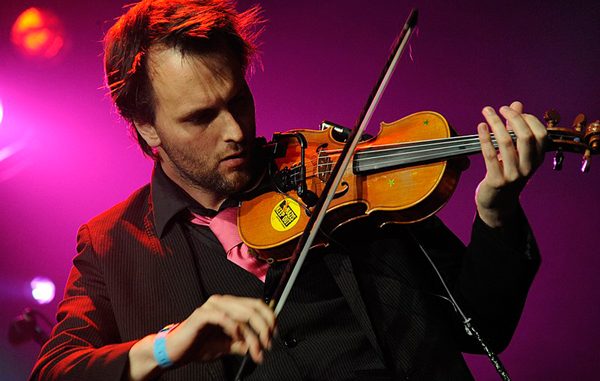
Located a few miles north of Reading in the beautiful Chilterns’ countryside, Nettlebed Folk Club has been bringing the cream of folk musicians, both old and new, to its small village hall for the best part of half a century on Monday nights. The audience, a mixture of regulars and new faces, is always knowledgeable, attentive and tuneful. Tonight it’s Jon Boden, who’s here to entertain and provoke us into thoughts of the future, and to explore what we stand to lose, as well as regain following the breakdown of western society.
Over a decade ago, the arrival of a new born led Boden to think about what would happen in a climate changed Britain where oil and gas have run out, people have returned to subsistence farming and are forced to make their own entertainment. After commencing his performance with a song about infanticide, Boden plays the first of several songs from his post apocalypse trilogy of albums; the third of which, ‘Last Mile Home’, was completed during the spring of 2020, when the world had shut down. The journey into this dystopian future begins with ‘We Do What We Can’ from the first album of the trilogy, ‘Songs From The Floodplain’. The crowd harmoniously complements Boden on the chorus, “From the fool to the wise man, From the floodplain to the dam, When hard times come knocking, We do what we can”.
It’s not all songs about the end of days though, Boden has a few of what he describes as “epics” in his repertoire. These are lengthy ballads, which must be a challenge to recall. Boden says he can only play one of these epics tonight and rather than perform ‘Rose In June’, a crowd favourite, he opts to do ‘The Land’, which is based on a Rudyard Kipling poem. This choice results in some friendly booing from the crowd. After two attempts at ‘The Land’, being unable to recollect all the lyrics, the audience are granted their wish and Boden straps on his electric guitar to perform a wonderful version of ‘Rose In June’, the first of two songs about shipwrecks in this evening’s set.
Before the interval we’re treated to ‘Hang Down’. It was originally written by the Salvation Army as a temperance marching song, with a catchy chorus, in the hope it would lead people on the path to abstinence. The plan backfired and it was co-opted, and corrupted by the drunken hordes into a drinking song. At the break Boden retires outside to sell CDs and have a pandemic friendly chat with the audience in the fresh air. Back from the break and it’s back to the future, with ‘Dancing In The Rain’ a Generation Z song about a fireworks party in what remains of a post petrol world.
Boden grew up in Winchester from where his father commuted back and forth to London. Whenever his dad missed his train home, he’d pop into a record shop to buy a CD for his son. His father’s purchase of the first Waterson: Carthy album caught Boden’s ear and over the past 20 years he’s frequently performed and recorded with the UK’s first family of folk music. From this album, he performs a moving version of ‘Sleep On Beloved’ in tribute to the force of nature that was Norma Waterson, who’d died the previous day.
The visit to our potential future concludes with ‘Last Mile Home’. It’s about the couple who are the focus of the album trilogy, who are now in their 50s, travelling east across England towards the ocean in the hope of finding a better life. A singalong version of Bellowhead’s ‘New York Girls, Can’t You Dance The Polka’ completes a superb evening. After stacking chairs and collecting the empty glasses, it’s off into the night, reflecting on the fact that Boden is a fine standard bearer to take the tradition of singers such as Martin Carthy and Norma Waterson into the future, even it turns out to be one devoid of the home comforts that fossil fuels afford us.


